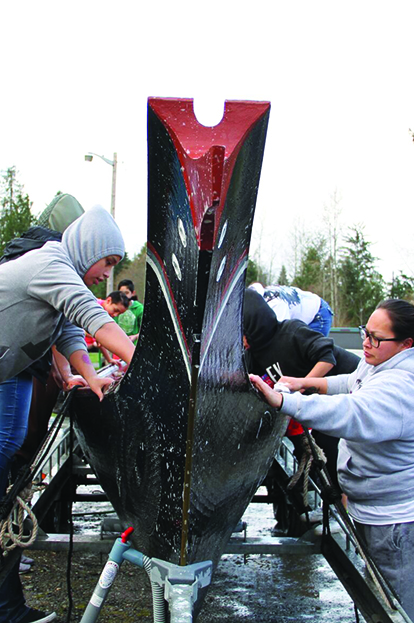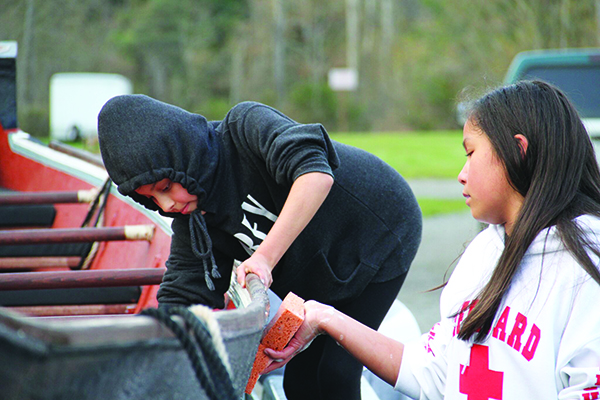
educators came together to support those affected by autism.
By Micheal Rios, Tulalip News
The eleventh annual World Autism Awareness Day took place on Monday, April 2, making for a ceremonious start to the month of April, recognized as autism awareness month. Autism-friendly events and educational activities take place all month to increase understanding and acceptance and foster worldwide support for an often misunderstood complex developmental disorder.
Autism spectrum disorder (ASD) is a developmental disability with signs beginning to show during the early childhood years. Autism is not a single disorder; it is rather a wide range of complex disorders that affects children differently. Primarily, it affects children’s abilities to communicate and interact with others. There is no known cause for ASD, but its prevalence figures are on the rise. In fact, autism is one the fastest-growing serious developmental disabilities in the U.S.
As of 2016, the prevalence of autism is 1 in every 68 children in the United States, including 1 out of 42 boys and 1 in 189 girls. Approximately 100 individuals are diagnosed every day in the U.S., and it’s currently estimated there are more than 2 million people affected by autism in this country alone.
Creating an environment to support and learn more about the affliction, Tulalip Youth Services coordinated the Walk for Autism Awareness that took place on April 2. All families and children affected by autism were invited to participate, and were joined by a gathering of community supporters.
“We wanted to raise awareness for our children and families affected by autism,” explains event co-coordinator, Shylee Burke, an Activities Specialist. “It’s important to educate our community that we have children with autism as our number of tribal members diagnosed with autism has continued to rise over the last ten years. We had lots of youth participate in the walk, including several with autism. Thank you to our community and all the people who joined us for the walk and showed their support.”
Board of Director, Bonnie Juneau, came out and showed her support by joining the eighty-person herd as they walked 1.5 miles on a route that started at the youth center, went to the marina, and then back to the youth center.
“It was great to see all the community; the kids, the adults and even some elders joined in a common cause to walk for our children with challenges,” said Bonnie. “It was a beautiful day, the sun came out at the perfect time. The love, support and solidarity of the community is always great thing to see in Tulalip.”
Autism awareness month is critical for promoting education and mindfulness in diagnosing young children and providing them with the resources they need. A variety of education-related materials, including flyers, pamphlets and medical specialist information was distributed before and after the walk.
The Walk for Autism Awareness was especially meaningful for those Tulalip community families for whom autism is ever-present in their lives.
“April 2 means more than it ever did before. My son, Jared Parks II, was diagnosed with autism spectrum disorder last year,” revealed Kristie Fryberg. “My baby boy has taught me so much in his little life. I love him so much and enjoy the unexpected every day!”
“This is something near and dear to my heart because my five-year-old son has autism,” added Jared Parks, Board of Director. “I walked for him, and to support all the kids who are on the spectrum.”
The support-based event gave the Holmes family an opportunity to participate in their first ever Autism Awareness Walk. Monica and Eric Holmes are parents to four children affected by autism, ranging in age from 20 down to 9.
“It was heartening to see so many community members come out to support our youth with autism,” shared Eric, who also works for a non-profit dedicated to special needs adults. “As a parent of children on the spectrum, I’ve learned that individuals with autism are as unique in their needs and desires as individuals without autism. Autism is a spectrum, so learning and teaching, working with and loving them is not a one size fits all prescription. I am grateful for what my boys have taught me, which is more patience, humility and gratitude for all that I have been blessed with.”
“With four children affected by autism, doing large scale events in the community is often difficult for us. Even a walk to honor and bring awareness to the very issues our kids are struggling with cuts right to the heart of the challenges associated with living with autism,” explained Monica, Prevention Specialist for Community Health.
“Sensory challenges like bright lights, loud noises, crowds, multiple activities going on at once, transitions from one locale to the next, affect them immensely,” she continued. “I believe the lessons learned today will go a long way in bringing improved support and resources, less bullying and more understanding of kids on the spectrum and the families that love them.”
Following the leisurely stroll surrounded by family and friends united in a common goal, the group continued to be support one another by doing a fun activity that meant signing each other’s t-shirts to remember the day. This was a highlight to many of the kids, who eagerly wrote their names in bright and bold colors on one t-shirt after another.
Ten-year-old Josh Holmes, who has autism, said “my favorite part of the day was when lots of people signed my autism awareness t-shirt. I got 10 signatures all over it.”
“I liked the walk because we got to see so many people who waved and honked at us while we were walking,” added younger brother Isaiah Holmes, who also is diagnosed with autism. “It made me happy to get lots of people to sign my shirt all over. And I got to ride in an ATV for some of the walk.”
The event turned out better than expected with so many joining in to show support and help spread awareness. It’s only part of a new initiative to implement programs to support all children with autism. In addition, it raises the idea of promoting acceptance and inclusion among everyone.
Supporters consistently say that improving public understanding of autism is their top priority. Better understanding of autism improves lives, increasing the chances of an early diagnosis and support, lowering incidents of bullying at school, and teaches invaluable lessons about embracing differences. As the saying goes, “Why fit in when you can stand out?”















